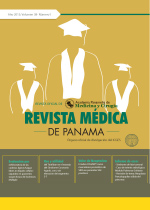Terapia celular con linfocitos CAR-T: una droga viviente.
Autores/as
DOI:
https://doi.org/10.37980/im.journal.rmdp.2017461Resumen
[Cell therapy with CAR-T lymphocytes: a living drug]
Resumen
La cirugía, la quimioterapia, la radioterapia, y la terapia blanco, han sido las armas para combatir el cáncer. La inmunoterapia es lo novedoso. Son tratamientos que reclutan el poderío del propio sistema inmune del paciente para combatir el cáncer. Uno de estos abordajes de inmunoterapia de rápido desarrollo y crecimiento es la llamada transferencia adoptiva de linfocitos T, del inglés “adoptive cell transfer” (ACT) que no es más que cosechar y utilizar las propias células inmunes del paciente para combatir su cáncer. Existen varios tipos. Nos ocuparemos de la llamada terapia con linfocitos T modificados con receptores antigénico quiméricos, del inglés “chimeric antigen receptor” (CAR). El uso de las células T con receptores antigénicos quiméricos, del inglés “CAR-T cell” a tenido sorprendentes respuestas que se han producido en algunos pacientes, tanto niños como adultos, por lo que en el año 2017, la “Food and Drug Administration” (FDA) de los Estados Unidos de América aprobó dos células CAR-T, una para el tratamiento de niños con leucemia linfoblástica aguda (LLA) y la otra para adultos con linfomas avanzados. Se han llevado a cabo y publicado varios ensayos de terapia con células CAR-T en niños y adultos. Jóvenes con leucemia aguda linfoblástica que han recidivado o que no han respondido a los tratamientos existentes. En un estudio dirigido contra el antígeno CD19, todas las evidencias clínicas de enfermedad desaparecieron (respuesta completa) en 27 de 30 pacientes. En ensayos clínicos preliminares, el uso de células CAR-T dirigidas contra el antígeno BCMA en pacientes con mieloma múltiple avanzado, más de la mitad de los pacientes han alcanzado una remisión completa. Existe un gran entusiasmo sobre el potencial de utilizar las terapias con células CAR-T en etapas más tempranas en los niños con leucemia aguda linfoblástica; especialmente en los de “alto riesgo” de recidiva. Hay un mundo de opciones y caminos a investigar con la terapia adoptiva celular incluyendo no solo las CAR-T, sino los “linfocitos infiltradores de tumores” (TIL) y las células T con receptores específicos (TCR) y no solamente en neoplasias hematológicas sino también en tumores sólidos.
Abstract
Surgery, chemotherapy, radiotherapy, and white therapy have been the weapons to fight cancer. Immunotherapy is the novelty. They are treatments that recruit the power of the patient's own immune system to fight cancer. One of these approaches of immunotherapy of rapid development and growth is the so-called adoptive transfer of T lymphocytes, from the English "adoptive cell transfer" (ACT) which is nothing more than harvesting and using the patient's own immune cells to fight their cancer. There is a lot of types. We will deal with the so-called therapy with modified T lymphocytes with chimeric antigen receptors, from the English "chimeric antigen receptor" (CAR). The use of T cells with chimeric antigen receptors, from the English "CAR-T cell" has had surprising responses that have occurred in some patients, both children and adults, so in 2017, the "Food and Drug Administration "(FDA) of the United States of America approved two CAR-T cells, one for the treatment of children with acute lymphoblastic leukemia (ALL) and the other for adults with advanced lymphomas. Several therapy trials with CAR-T cells have been carried out and published in children and adults. Young people with acute lymphoblastic leukemia who have relapsed or who have not responded to existing treatments. In a study directed against the CD19 antigen, all clinical evidence of disease disappeared (complete response) in 27 of 30 patients. In preliminary clinical trials, the use of CAR-T cells directed against the BCMA antigen in patients with advanced multiple myeloma, more than half of the patients have achieved a complete remission. There is great enthusiasm about the potential of using therapies with CAR-T cells at earlier stages in children with acute lymphoblastic leukemia; especially in those of "high risk" of recurrence. There is a world of options and ways to investigate with the cellular adoptive therapy including not only the CAR-T, but the "tumor infiltrating lymphocytes" (TIL) and the T cells with specific receptors (TCR) and not only in hematological neoplasias but also in solid tumors.
Publicado
Número
Sección
Licencia
Derechos autoriales y de reproducibilidad. La Revista Médica de Panama es un ente académico, sin fines de lucro, que forma parte de la Academia Panameña de Medicina y Cirugía. Sus publicaciones son de tipo acceso gratuito de su contenido para uso individual y académico, sin restricción. Los derechos autoriales de cada artículo son retenidos por sus autores. Al Publicar en la Revista, el autor otorga Licencia permanente, exclusiva, e irrevocable a la Sociedad para la edición del manuscrito, y otorga a la empresa editorial, Infomedic International Licencia de uso de distribución, indexación y comercial exclusiva, permanente e irrevocable de su contenido y para la generación de productos y servicios derivados del mismo. En caso que el autor obtenga la licencia CC BY, el artículo y sus derivados son de libre acceso y distribución.






